AWS Cloud Engineers are integral to managing and scaling cloud infrastructure. They ensure that cloud solutions are robust and optimized for performance, adapting to the needs of businesses and their technical requirements.
Skills necessary for an AWS Cloud Engineer include proficiency in AWS services, understanding of cloud security, and expertise in scripting languages. Additionally, strong problem-solving abilities and effective communication are essential.
Candidates can write these abilities in their resumes, but you can’t verify them without on-the-job AWS Cloud Engineer skill tests.
In this post, we will explore 8 essential AWS Cloud Engineer skills, 10 secondary skills and how to assess them so you can make informed hiring decisions.
Table of contents
8 fundamental AWS Cloud Engineer skills and traits
The best skills for AWS Cloud Engineers include AWS Proficiency, Networking Skills, Security Management, DevOps Practices, Database Management, Scripting & Automation, Monitoring & Analytics and Cost Optimization.
Let’s dive into the details by examining the 8 essential skills of a AWS Cloud Engineer.
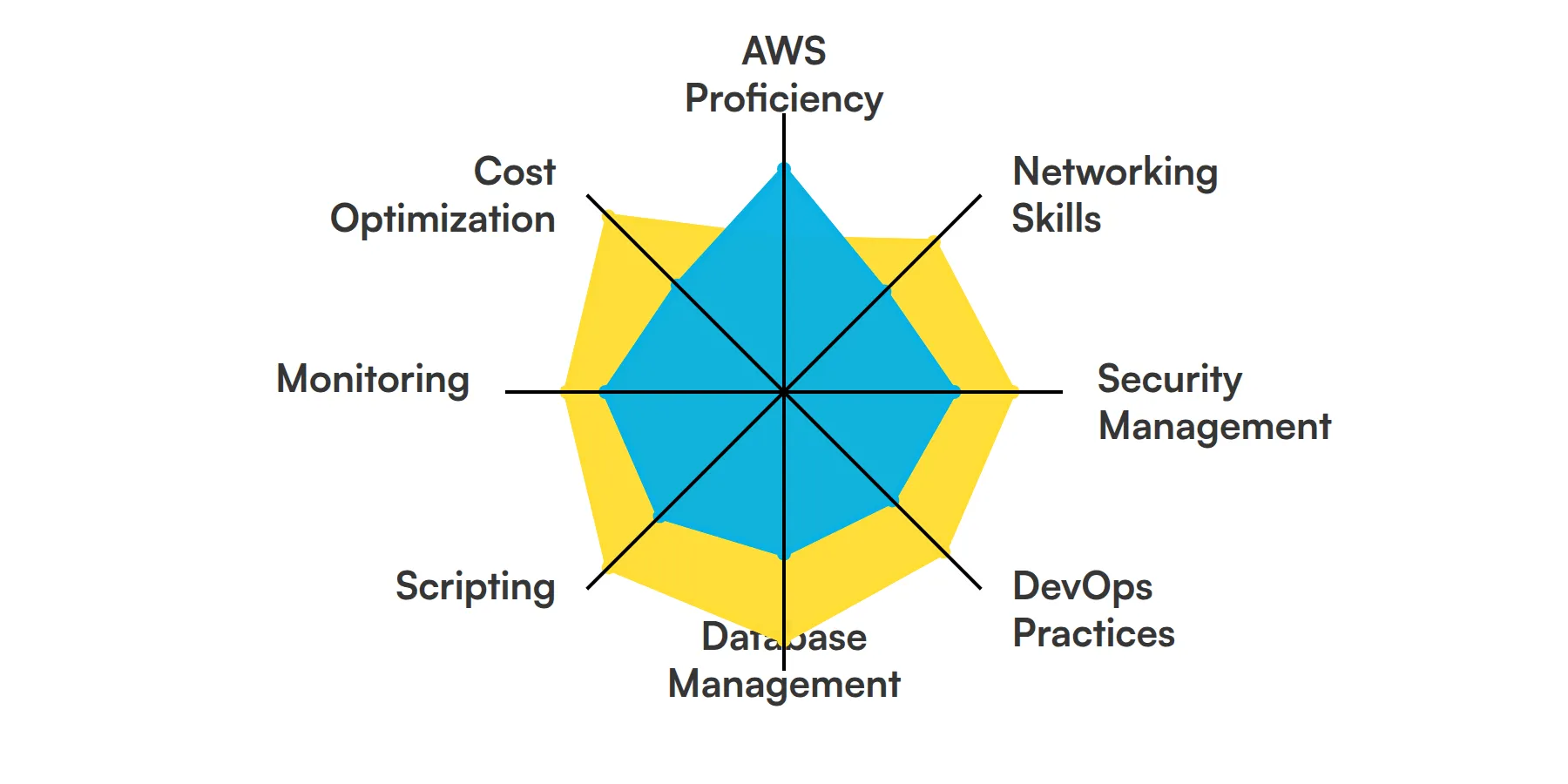
AWS Proficiency
An AWS Cloud Engineer must have a deep understanding of AWS services and architecture. This includes the ability to deploy, manage, and operate scalable systems on AWS. Knowledge of EC2, S3, RDS, and Lambda is fundamental for building and maintaining robust cloud solutions.
Check out our guide for a comprehensive list of interview questions.
Networking Skills
Networking is key in cloud environments. AWS Cloud Engineers need to design and implement network configurations that ensure secure and efficient data flow. Skills in VPC, Route 53, and API Gateway are necessary to manage connectivity and service integration effectively.
Security Management
Security in the cloud is paramount. AWS Cloud Engineers must implement and manage security policies using IAM, KMS, and Security Groups. Understanding the shared responsibility model and applying best security practices protects data and infrastructure against threats.
For more insights, check out our guide to writing a Cyber Security Analyst Job Description.
DevOps Practices
Implementing DevOps practices is essential for automating software deployment and infrastructure changes. AWS Cloud Engineers use tools like AWS CodeBuild, CodeDeploy, and CodePipeline to streamline development cycles and enhance collaboration between development and operations teams.
Database Management
Proficiency in managing databases is crucial for AWS Cloud Engineers. They should be skilled in RDS, DynamoDB, and Elasticache to handle data storage, retrieval, and scaling challenges efficiently, ensuring high availability and performance.
Scripting & Automation
Scripting and automation are the backbones of efficient cloud management. AWS Cloud Engineers use scripting languages like Python or Bash and tools like CloudFormation and Terraform to automate deployments and manage infrastructure as code.
Check out our guide for a comprehensive list of interview questions.
Monitoring & Analytics
Continuous monitoring and analytics are vital for maintaining system health and performance. AWS Cloud Engineers utilize CloudWatch, CloudTrail, and AWS X-Ray to monitor resources, analyze logs, and troubleshoot issues promptly.
Cost Optimization
Managing costs effectively is a key responsibility of an AWS Cloud Engineer. They need to optimize resource usage and costs using tools like AWS Cost Explorer and Trusted Advisor to ensure efficient financial management of cloud resources.
10 secondary AWS Cloud Engineer skills and traits
The best skills for AWS Cloud Engineers include CI/CD Integration, Load Balancing, Hybrid Cloud, Serverless Architecture, Data Encryption, Compliance Knowledge, Disaster Recovery, Performance Tuning, API Integration and Containerization.
Let’s dive into the details by examining the 10 secondary skills of a AWS Cloud Engineer.
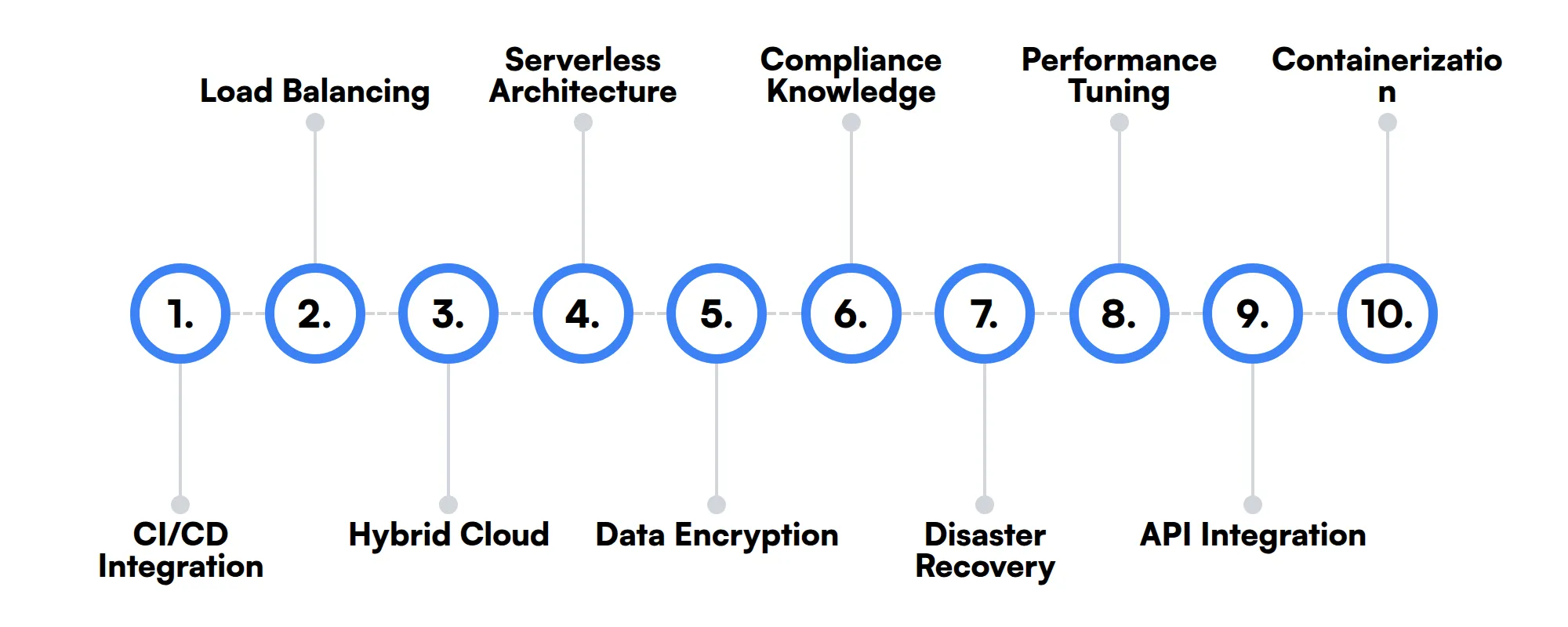
CI/CD Integration
Knowledge of continuous integration and continuous deployment (CI/CD) methodologies helps AWS Cloud Engineers streamline updates and maintain high-quality software production.
Load Balancing
Understanding load balancing techniques and tools, such as Elastic Load Balancing (ELB), is important for distributing traffic and ensuring durability and fault tolerance across applications.
Hybrid Cloud
Experience with hybrid cloud environments enables AWS Cloud Engineers to integrate on-premises infrastructure with cloud resources, facilitating seamless data and application mobility.
Serverless Architecture
Familiarity with serverless architectures allows AWS Cloud Engineers to build and manage applications without concerning about the underlying servers, using services like AWS Lambda.
Data Encryption
Skills in data encryption and secure data transfer are essential for protecting sensitive information in transit and at rest, using AWS tools like KMS and SSL/TLS.
Compliance Knowledge
Understanding compliance requirements relevant to various industries helps AWS Cloud Engineers ensure that cloud deployments adhere to legal and regulatory standards.
Disaster Recovery
Ability to design and implement disaster recovery strategies ensures business continuity by minimizing downtime and data loss in emergency scenarios.
Performance Tuning
Skills in performance tuning are necessary for optimizing application responsiveness and efficiency, particularly in scalable cloud environments.
API Integration
Proficiency in API integration facilitates seamless connectivity between different services and applications, enhancing functionality and user experience.
Containerization
Knowledge of container technologies like Docker and Kubernetes is beneficial for deploying and managing containerized applications efficiently in AWS environments.
How to assess AWS Cloud Engineer skills and traits
Assessing the skills and traits of an AWS Cloud Engineer is a multifaceted challenge. It involves evaluating a broad spectrum of technical abilities from AWS proficiency to scripting and automation. Understanding how to effectively gauge these skills is key to identifying candidates who are not only technically adept but also a good fit for your team's culture and workflow.
While resumes may highlight a candidate's certifications and experience, they often fall short of revealing their practical expertise and problem-solving capabilities. This is where skills-based assessments come into play. By incorporating real-world scenarios and challenges, you can see how candidates handle typical tasks they would encounter on the job.
For a comprehensive evaluation, consider using Adaface assessments, which are designed to mirror the complexity and variety of AWS Cloud Engineer responsibilities. From networking skills to cost optimization, these tests provide a thorough understanding of a candidate's capabilities. By integrating Adaface into your hiring process, you can achieve a 85% reduction in screening time while ensuring a high quality of hires. Learn more about our tailored assessments here.
Let’s look at how to assess AWS Cloud Engineer skills with these 6 talent assessments.
Advance Networking in AWS Online Test
Our Advance Networking in AWS Online Test evaluates a candidate's understanding of various networking concepts and their implementation on the Amazon Web Services (AWS) platform.
The test covers AWS Networking, VPC, Subnets, Route Tables, Internet Gateways, NAT Gateways, VPC Peering, VPN Connections, Direct Connect, Load Balancers, DNS in AWS, and Network Security in AWS. It assesses the candidate's ability to design, configure, and troubleshoot network architectures in AWS.
Candidates who perform well demonstrate a strong grasp of AWS networking services and the ability to manage complex network configurations.
Network Engineer Online Test
Our Network Engineer Online Test uses scenario-based multiple choice questions to evaluate candidates on their technical knowledge and practical skills related to computer networking.
The test covers network protocols, network security, routing and switching, network troubleshooting, wireless networking, network design, network management, TCP/IP, LAN/WAN, and network performance optimization. It assesses candidates' proficiency in designing, implementing, and maintaining complex network infrastructures.
High-scoring candidates show proficiency in diagnosing and resolving network issues and optimizing network performance.
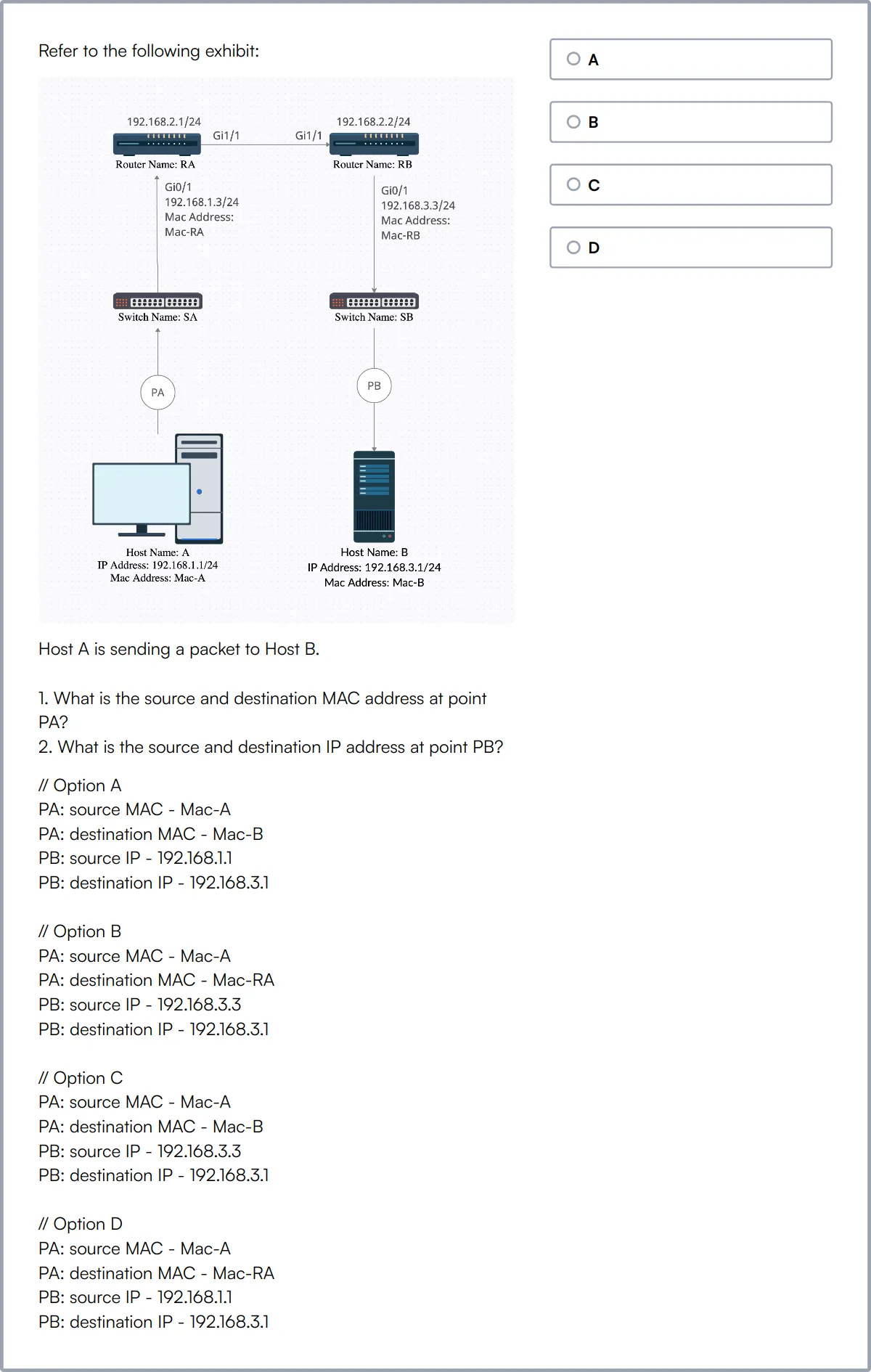
Cyber Security Assessment Test
Our Cyber Security Assessment Test evaluates candidates on Cyber Security basics, their ability to detect security risks, and setup guards against future cyber attacks.
The test covers network security, cybersecurity attacks, cryptography, web security, email security, malware, data security, data governance, cybersecurity defenses, risk assessments, and network tests. It assesses the candidate's ability to use cryptography techniques and perform penetration tests.
Successful candidates demonstrate a comprehensive understanding of cybersecurity principles and the ability to implement effective security measures.
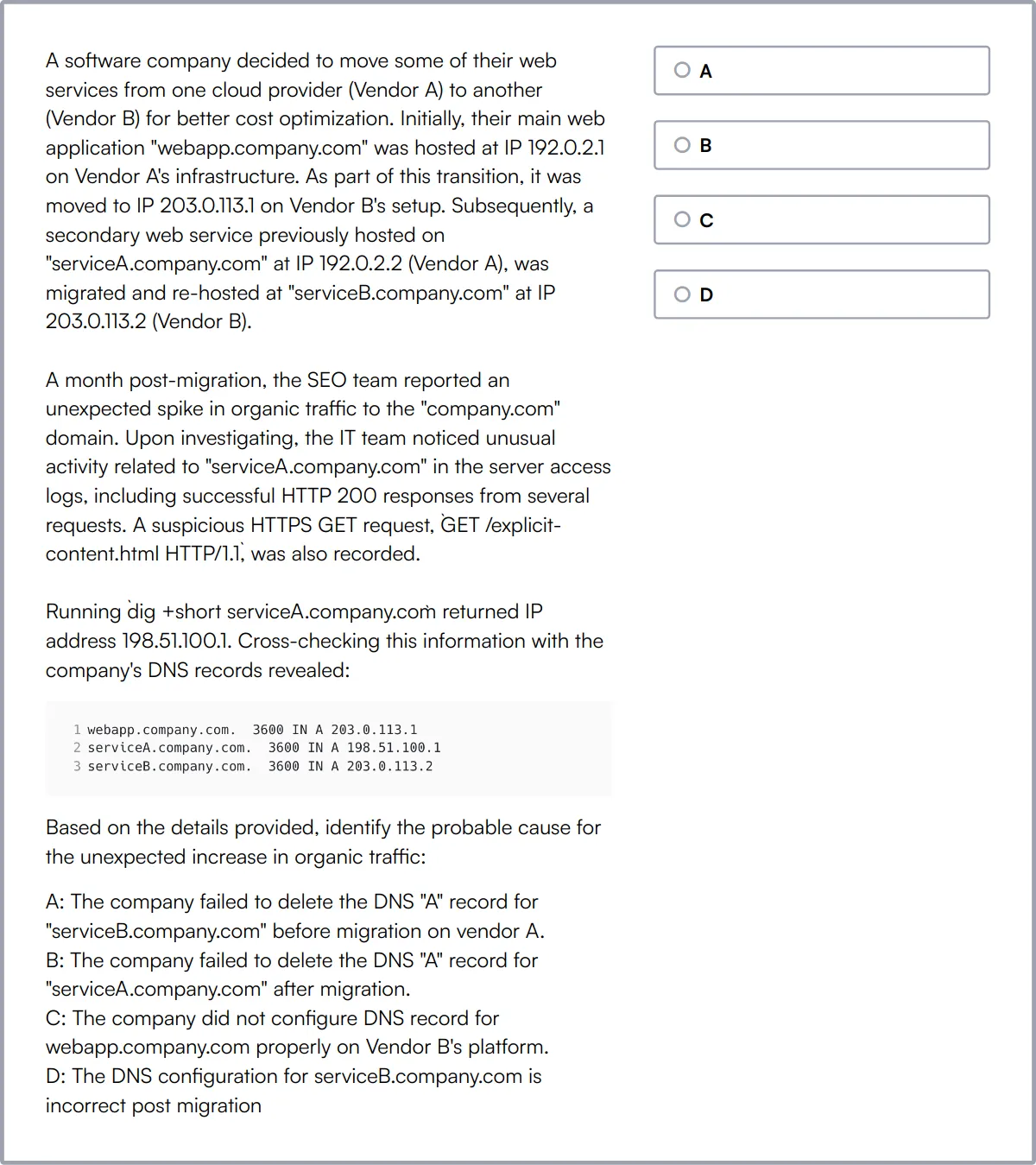
DevOps Test
Our DevOps Test is a scenario-based online test designed to assess a candidate's proficiency in working with Linux, Git, Python, Docker, and DevOps skills.
The test covers Git basics, Git workflows, Docker containers and volumes, Linux commands, shell scripting, Python fundamentals, and DevOps practices. It evaluates the candidate's ability to manage code repositories, automate processes, and deploy applications.
Candidates who excel in this test show strong skills in automation, version control, and containerization.
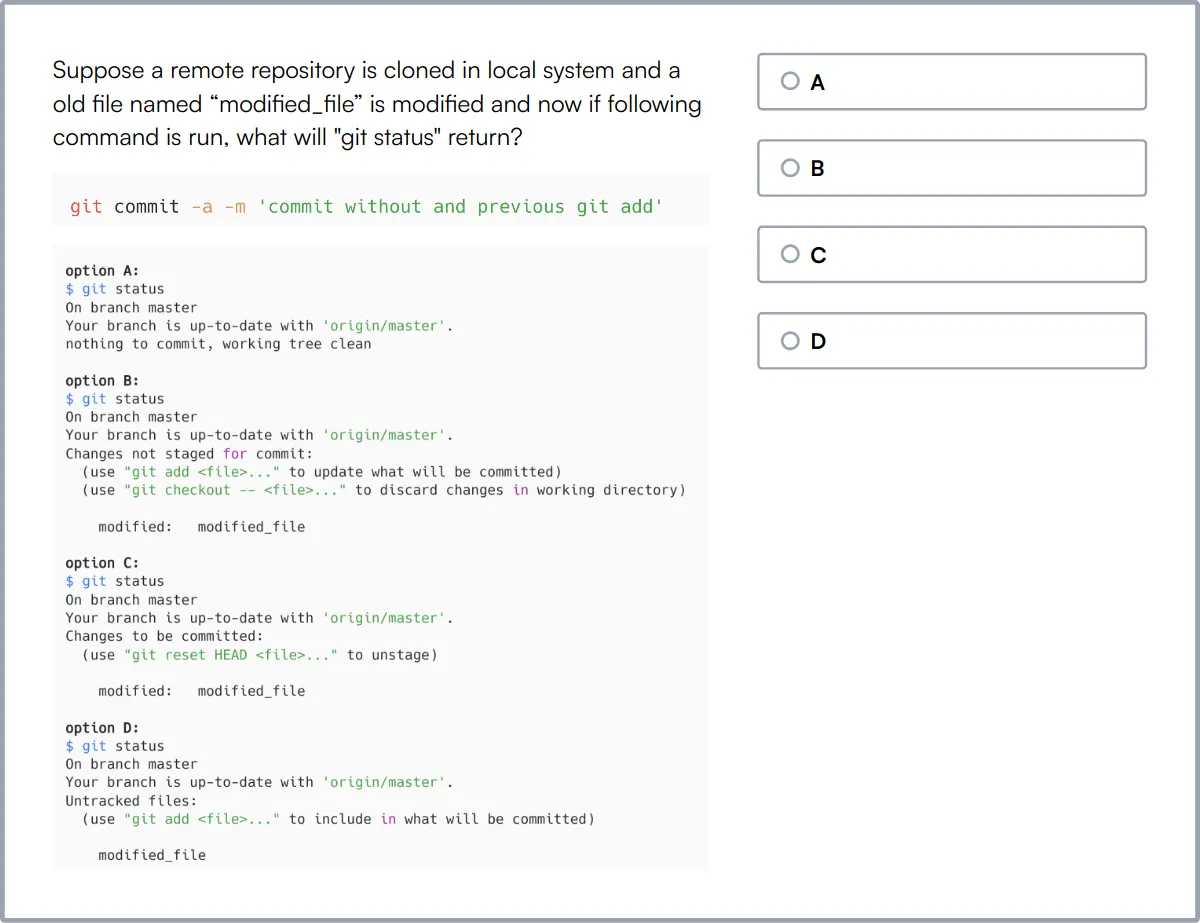
MySQL Online Test
Our MySQL Online Test uses scenario-based MCQs to evaluate candidates on their proficiency in using MySQL.
The test covers MySQL, database design, SQL queries, normalization, indexing, transactions, and stored procedures. It assesses the candidate's ability to work with MySQL databases and manage data effectively.
High-scoring candidates demonstrate strong skills in database management and the ability to optimize queries for performance.

Linux Shell Online Test
Our Linux Shell Online Test evaluates a candidate's knowledge and proficiency in working with the Linux command line and shell scripting.
The test covers Linux shell, command line, shell scripting, Linux file system, process management, networking in Linux, permissions and security, package management, text processing, shell variables, and regular expressions. It assesses the candidate's ability to automate tasks and manage Linux systems.
Candidates who perform well demonstrate strong command line skills and the ability to write efficient shell scripts.
Summary: The 8 key AWS Cloud Engineer skills and how to test for them
| AWS Cloud Engineer skill | How to assess them |
|---|---|
| 1. AWS Proficiency | Evaluate understanding of AWS services and their practical applications. |
| 2. Networking Skills | Assess ability to design and manage cloud network architectures. |
| 3. Security Management | Check knowledge of implementing security best practices in AWS. |
| 4. DevOps Practices | Review experience in automating and streamlining cloud operations. |
| 5. Database Management | Measure skills in managing and optimizing cloud-based databases. |
| 6. Scripting & Automation | Test ability to automate tasks using scripts and tools. |
| 7. Monitoring & Analytics | Evaluate skills in using tools for cloud performance monitoring. |
| 8. Cost Optimization | Assess strategies for reducing cloud service costs effectively. |
Cloud Computing Online Test
AWS Cloud Engineer skills FAQs
What are the key AWS skills required for a Cloud Engineer?
AWS Cloud Engineers should be proficient in managing AWS services such as EC2, S3, RDS, and Lambda. They should also understand AWS networking and security best practices, and be familiar with AWS management tools.
How can networking skills impact the effectiveness of an AWS Cloud Engineer?
Networking skills are critical for setting up VPCs, VPNs, and Direct Connect. These skills ensure secure and efficient data flow between different parts of the cloud infrastructure and on-premises environments.
What is the role of security management in AWS?
Security management in AWS involves configuring IAM roles and policies, securing data with encryption, and implementing security groups and network ACLs to protect resources from unauthorized access.
Why are DevOps practices important for AWS Cloud Engineers?
DevOps practices help AWS Cloud Engineers automate software deployment and infrastructure updates, which leads to faster and more reliable delivery of applications and services.
How does database management fit into the AWS Cloud Engineer role?
Database management for AWS Cloud Engineers includes setting up, configuring, and maintaining databases such as Amazon RDS, DynamoDB, and Redshift, ensuring high availability and performance.
What should recruiters look for when assessing scripting and automation skills in AWS Cloud Engineers?
Recruiters should look for experience with scripting languages like Python or Bash, and familiarity with automation tools like AWS CloudFormation or Terraform, which are used to automate cloud resource provisioning.
How do monitoring and analytics enhance AWS cloud management?
Effective use of AWS monitoring tools like CloudWatch and CloudTrail helps in tracking resource usage, detecting anomalies, and optimizing performance, thereby ensuring efficient operation and cost management.
What is the importance of CI/CD integration in AWS?
CI/CD integration is important for automating the testing and deployment of code in AWS environments, helping teams to release updates quickly and with minimal errors.

40 min skill tests.
No trick questions.
Accurate shortlisting.
We make it easy for you to find the best candidates in your pipeline with a 40 min skills test.
Try for freeRelated posts
Free resources



